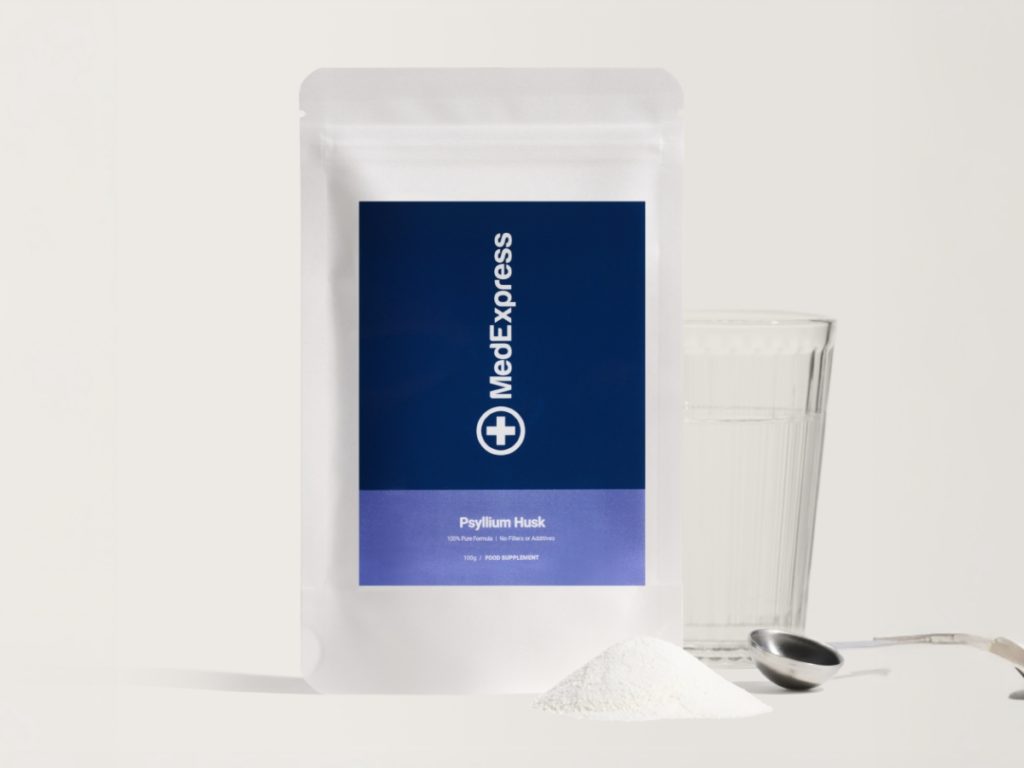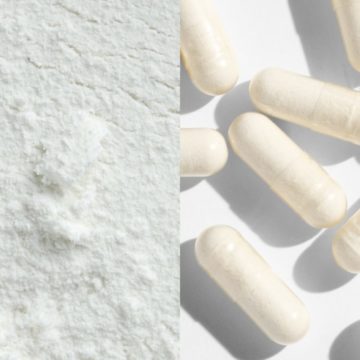When it comes to weight management or losing weight, finding effective natural solutions that boost your efforts can be a game-changer. Many people are turning to psyllium husk to support them in their weight loss journeys. But does it work, how does it work, and how do you use it?
Let’s explore how this fibre-packed ingredient can support healthy and sustainable weight loss.
What is Psyllium Husk?
Psyllium husk is a type of soluble fibre that comes from the seeds of the plantago ovata plant. [1] It’s often used as a dietary supplement to promote digestive health, but its benefits go beyond gut health, and many have found it to be a valuable tool in helping them lose weight or manage their weight.
Psyllium husk is:
- Rich in soluble fibre. It absorbs water and forms a gel-like substance in the gut.
- Low in calories. It helps increase fullness without adding excess calories.
- Gluten-free and natural. It’s suitable for a wide range of dietary needs, including vegetarians and vegans.
How Can Psyllium Husk Help With Weight Loss?
Psyllium husk plays an important role in weight loss by influencing digestion (how your body absorbs food and nutrients), appetite (how hungry you feel) and metabolism (how quickly your body processes food and nutrients). [2]
When mixed with water, psyllium expands in the stomach, slowing down the absorption of food and helping you feel full for longer. This can naturally reduce calorie intake and help curb cravings.
One of the biggest challenges in weight loss is controlling appetite, and the way that psyllium husk expands in the stomach means you’ll feel fuller from eating smaller portions. [3] It also stabilises blood sugar levels, preventing sudden spikes and dips that can lead to cravings.
How Does Psyllium Husk Work?
Psyllium husk is a soluble fibre, meaning it passes through the small intestine without being completely broken down or absorbed. It soaks up water to form a gel that makes stools softer by increasing their water content. [4]
Psyllium Husk and Gut Health
A healthy digestive system is essential for effective weight management. Psyllium husk promotes gut health by encouraging regular bowel movements and preventing constipation, and encouraging a well-balanced gut microbiome, which plays a key role in metabolism. [5] Your metabolism converts food into energy that the body needs to function properly. A healthy metabolism is essential for overall wellbeing and helps your body absorb nutrients efficiently.
How Do I Use Psyllium Husk for Weight Loss?
Psyllium husk is generally available in powder form, or as pills. This makes it convenient to use on a daily basis. You’ll find it in many pharmacies and health food shops.
The amount of psyllium husk you need depends on your current fibre intake and health goals. To meet your daily fibre needs, you might require multiple doses per day, depending on the product you’re using. In the UK, there are no specific official recommendations for daily psyllium husk intake. However, the recommended daily fibre intake is 30 grams per day. [6]
Start with a smaller amount and gradually increase the dose so that your digestive system has an opportunity to get used to the new ingredient.
Are There Any Side Effects To Using Psyllium Husk?
Psyllium husk is generally a safe ingredient to use, and suitable for everyone looking to manage their weight or improve their digestive health. [7]
Some people may experience mild side effects, including:
- Gastrointestinal discomfort: Bloating, gas or cramps can occur if psyllium husk is taken in large amounts or without enough water.
- Allergic reactions: Some individuals may be allergic to psyllium husk. Look out for symptoms such as rashes or breathing difficulty and stop using the ingredient immediately if this happens. [8]
- Choking hazard: Psyllium husk can swell and block the throat if not consumed with enough water, so always be sure to follow the product guidelines on how much fluid to add.
Always consult a healthcare provider before using psyllium husk if you have difficulty swallowing, existing medical conditions or are on medication.
How Does Psyllium Husk Compare To Weight Loss Medications?
Unlike prescription weight loss medications such as GLP-1s, psyllium husk offers a natural and non-pharmaceutical approach to weight management. It’s affordable and supports a healthy digestive system, but can take longer to achieve results than GLP-1 treatments, which are generally fast-acting and clinically proven, but can be expensive. Like GLP-1s, psyllium husk helps with appetite control. Unlike GLP-1s, psyllium husk doesn’t require a prescription and isn’t associated with side effects like nausea and fatigue.
Can You Use Psyllium Husk and GLP-1s Together?
Yes — psyllium husk and GLP-1 medications (such as Wegovy) can be used together, and psyllium husk may even enhance results by further supporting appetite control and digestion.
Psyllium husk shouldn’t be seen as a replacement for GLP-1 medications, but by increasing your daily fibre intake it can help you achieve your goals alongside GLP-1 treatment. Psyllium husk can actually help manage some of the gastrointestinal side effects associated with taking GLP-1 medications by alleviating constipation, a very common side effect.
That said, you should always speak to a healthcare professional before combining supplements with prescription medications.
How Does Psyllium Husk Compare to GLP-1s For Weight Loss?
While GLP-1s are a clinically proven weight loss treatment, psyllium husk is not. Scientific studies have shown mixed results in how effective psyllium husk is for weight loss, [9, 10] though many people find it a useful tool to support their journey. Psyllium should be viewed as a supplementary option for increasing your fibre intake to support overall digestive health and weight management.
| Psyllium Husk | GLP-1s | ||
| Prescription required? | No | Yes | |
| Clinically proven? | No | Yes | |
| Cost-effective? | Yes | No |
How To Incorporate Psyllium Husk Into Your Diet
In powder form, psyllium is a relatively easy ingredient to incorporate into many meals, as it can simply be stirred into drinks and sauces or added as a topper. Here are some ideas for incorporating psyllium husk into your diet.
- Mix it with water or juice for a quick and simple fibre boost
- Stir it into smoothies to enhance satiety and nutrients
- Add it to soups, yoghurt or porridge for extra fibre intake.
Recipe Ideas With Psyllium Husk
- Pancakes: A portion of psyllium husk can be added to your pancake batter for a fibre boost.
- Overnight oats: Mix psyllium husk with oats, your milk of choice, chopped fruit, nuts and seeds for a nutritious and filling breakfast.
- Low-carb bread: Use psyllium husk as a binding agent in homemade, low-carbohydrate bread recipes.
Psyllium husk is a simple and effective natural supplement for supporting healthy digestion and sustainable weight loss, whether you’re combining it with prescribed medication or using it alone. This natural fibre can help to control your appetite, regulate your digestion and improve your digestion, allowing you to manage your weight and achieve your goals.
Ready to get started on your weight loss journey? Find out what treatment is suitable for you on our website.
References:
- Semeco A. Psyllium: Benefits, safety, and dosage [Internet]. www.medicalnewstoday.com. 2020. Available from: https://www.medicalnewstoday.com/articles/318707
- Brum JM, Gibb RD, Peters JC, Mattes RD. Satiety effects of psyllium in healthy volunteers. Appetite [Internet]. 2016 Oct [cited 2019 Oct 31];105:27–36. Available from: https://www.sciencedirect.com/science/article/pii/S0195666316301738
- Hervik AK, Svihus B. The Role of Fiber in Energy Balance. Journal of nutrition and metabolism [Internet]. 2019;2019:4983657. Available from: https://www.ncbi.nlm.nih.gov/pmc/articles/PMC6360548/
- Liu LWC. Chronic constipation: current treatment options. Canadian journal of gastroenterology = Journal canadien de gastroenterologie [Internet]. 2011 Oct;25 Suppl B(Suppl B):22B28B. Available from: https://pubmed.ncbi.nlm.nih.gov/22114754/
- Jalanka J, Major G, Murray K, Singh G, Nowak A, Kurtz C, et al. The Effect of Psyllium Husk on Intestinal Microbiota in Constipated Patients and Healthy Controls. International Journal of Molecular Sciences. 2019 Jan 20;20(2):433.
- National Health Service (NHS). How to get more fibre into your diet. [Internet]; [cited 2025 Mar 28]. Available from: https://www.nhs.uk/live-well/eat-well/digestive-health/how-to-get-more-fibre-into-your-diet/
- Brum JM, Gibb RD, Peters JC, Mattes RD. Satiety effects of psyllium in healthy volunteers. Appetite [Internet]. 2016 Oct;105:27–36. Available from: https://www.sciencedirect.com/science/article/pii/S0195666316301738
- Collado-Chagoya R, Hernández-Romero J, Eliosa-Alvarado GA, García-González AC, Campos-Gutiérrez RI, Velasco-Medina A, et al. Plantago psyllium-secondary anaphylaxis. Case report. Revista alergia Mexico (Tecamachalco, Puebla, Mexico : 1993) [Internet]. 2018;65(1):103–7. Available from: https://pubmed.ncbi.nlm.nih.gov/29723946/
- Gibb RD, Sloan KJ, McRorie JW Jr. Psyllium is a natural nonfermented gel-forming fiber that is effective for weight loss: A comprehensive review and meta-analysis. J Am Assoc Nurse Pract. 2023 Aug 1;35(8):468-476. doi: 10.1097/JXX.0000000000000882. PMID: 37163454; PMCID: PMC10389520.
- Darooghegi Mofrad M, Mozaffari H, Mousavi SM, Sheikhi A, Milajerdi A. The effects of psyllium supplementation on body weight, body mass index and waist circumference in adults: A systematic review and dose-response meta-analysis of randomized controlled trials. Crit Rev Food Sci Nutr. 2020;60(5):859-872. doi: 10.1080/10408398.2018.1553140. Epub 2019 Mar 18. PMID: 30880409.



